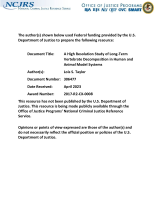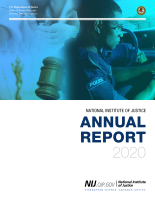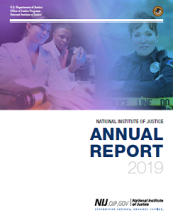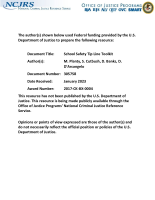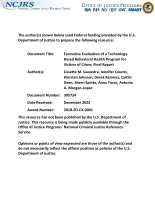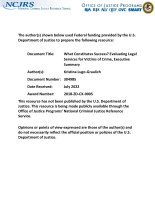Evaluative Research
Examining Intersections between Law Enforcement and Victims
National Institute of Justice Annual Report 2020
NIJ FY23 W.E.B. Du Bois Program of Research on Reducing Racial and Ethnic Disparities in the Justice System
Department of Justice: Elder maltreatment initiatives
Gender-Based Violence and the Latinx Community
See the YouTube Terms of Service and Google Privacy Policy
Economic Justice for Survivors of Intimate Partner Violence
See the YouTube Terms of Service and Google Privacy Policy
Defining and Studying Elder Abuse Polyvictimization
NIJ Social Science Analyst Yunsoo Park shares her knowledge about elder abuse, a widespread issue in the U.S. and around the world, particularly polyvictimization — the experience of a range of different types of abuse and maltreatment. As much as 11% of community-residing older adults experienced some form of abuse or mistreatment in the past year. Yunsoo discusses risk factors, difficulties in defining and studying elder abuse polyvictimization, and strategies for intervention and prevention. Stacy Lee Reynolds, a Communications Assistant with NIJ, hosts.
Can PSM Strategies Replicate RCT Results in Criminal Justice Research?
National Institute of Justice Fiscal Year 2019 Annual Report
School Safety Tip Line Toolkit
Formative Evaluation of a Technology-Based Behavioral Health Program for Victims of Crime, Final Report
Embracing Tribal Culture to Build Research Partnerships
Evaluation of a Community-focused Violence Intervention and Prevention Program
National Scan, Case Studies, and Evaluability Assessments of Restorative Justice Programs for Serious and Violent Harm
Forensic Technology Center of Excellence, Fiscal Year 2021
FIU - Forensic Technology Center of Excellence
Investigating Impulsivity as a Root Cause of School Violence: A Systematic Review and Meta-Analysis
How Do “Credible Messenger” Mentors Promote Youth Development? A Retrospective, Longitudinal Study in Atlanta, Birmingham, and Houston
Funding Support for the Operations of the Committee on Law and Justice of the National Academies of Sciences, Engineering, and Medicine
Support for Research, Testing, and Evaluation of Counter-Unmanned Aerial Systems in Law Enforcement Operations
Statewide Law Enforcement Crime Research, Evaluation, and Analysis
Tribal Crime, Justice, and Safety, Part 2
Stacy Lee Reynolds and Christine (Tina) Crossland continue their discussion of tribal crime, justice, and safety, including how Native American persons experience crime victimization at higher rates than non-Native people and the jurisdictional complexities in responding to tribal crime, justice, and safety. Read the transcript.
Listen to the first half of Stacy and Tina’s discussion.
Reading and Resources from NIJ
Tribal-Researcher Capacity Building Grants


